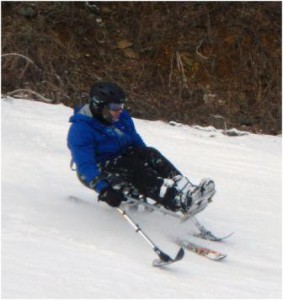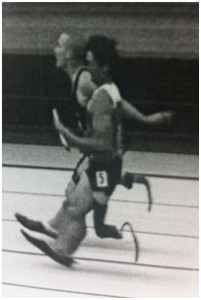By Emily D. Anderson, WTC Communications Division

Army’s Sitting Volleyball athletes listen to the National Anthem before the start of the third annual sitting volleyball tournament held at the Pentagon on November 21. (Photo LuAnn Georgia, WTC Communications Division)
Exciting, fast-paced and inspirational were a few words used to describe the Third Annual Joint Services Sitting Volleyball Tournament hosted by the Office of Warrior Care Policy, Office of the Under Secretary of Defense for Personnel and Readiness.
“This event is a big deal, and I am happy and nervous to be an Army representative and looked forward to the level of competition,” said Sgt. 1st Class David Hall, assigned to the Warrior Transition Brigade, Walter Reed National Military Medical Center.
“For a while I didn’t know what activities were out there that I could do,” Hall explained. “I think sitting volleyball is a great sport that puts everyone, regardless of injury, on an even level.”
The annual event consisted of Service members and Veterans from every branch of the military and the Special Operations Command (SOCOM) competing against each in an adaptive reconditioning event that highlights the importance of remaining active after injury and illness.
“I think the event went pretty good, and we were definitely holding our own against the other teams,” Hall added. “The coach was great, and I would compete again.”
J.D. Malone, the Army’s sitting volleyball coach, had nothing but good things to say about the team and Hall’s performance during the tournament. “I’m pretty amazed that they came together so fast, and Hall was a team player who would take what was asked of him and go back to the net and execute it.”
“In two days, the athletes learned to aggressively play at the net, and they were able to serve with accuracy,” said Malone. “At one point, I could call a zone on the court, and the athletes were serving to that area.”

Soldiers assigned to Warrior Transition Units prepare to block a serve by a member of the Special Operations Command’s team at the third annual sitting volleyball tournament held at the Pentagon on November 21. (Photo LuAnn Georgia, WTC Communications Division)
For the past two years, Army secured a spot in the final rounds, but this year the Army’s team competed for third place against the SOCOM’s team.
“Sitting volleyball is pretty interesting especially if you’re not extremely mobile.” said Hall. “It lets you still play outside the normal perimeters and try something new.”
Hall said he was happy to be a part of a team and still experience activities despite his injuries. “I’ve always been pretty athletic and into sports, so with limited ability I thought I would be more of a watcher instead of a doer, but I realize that’s not true,” he said.
To watch a recap of the action, visit DVIDS and to learn more about adaptive reconditioning benefits and programs visit the WTC website.












